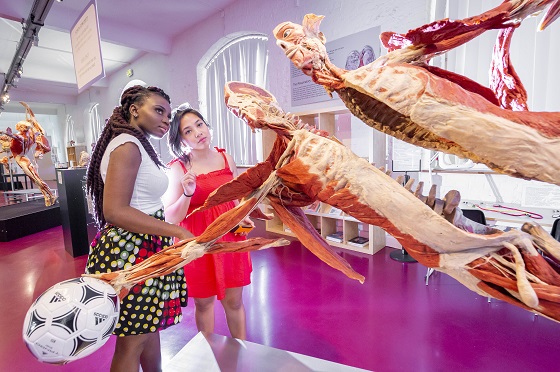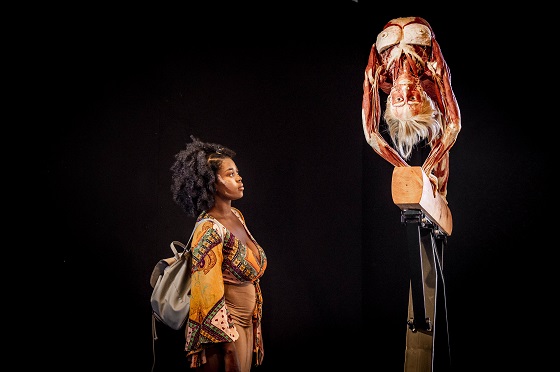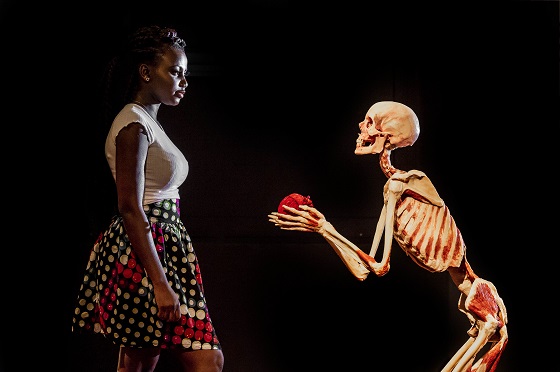Students entered a bizarre but mesmerising world of dissected body sculptures as part of this week’s #DMUglobal trip to Berlin.

The Biomedical Science and Medical Science students from De Montfort University Leicester (DMU) were a bit perturbed when they prepared to step into the Plastinarium, in the sparse and unassuming town of Gruben, on the Polish border east of Berlin.
Because Dr Hans Gunther Von Hagens’ has earned himself a worldwide reputation for indulging in the macabre by using his patented ‘plastination’ method to preserve donated bodies in silicone and turn them into artworks.
However, within a few minutes the students’ anxiety had lifted and they were in awe of what the museum was offering them.
A fascinating talk from their guide helped the students understand the plastination process, while a tour behind the scenes allowed those with strong stomachs to see bodies being dissected and prepared in silicone for distribution to medical teaching colleges and universities around the world.
They were then free to take in all the exhibits which included bodies stripped back to muscles and tendons, preserved, and then posed as, among other things, a gymnast, a hurdler, a painter and a ballet dancer. There were also dissected and plastinated animals, such as a 20ft great white shark and even a giraffe.
Medical Sciences student Suresh Vaddiraju said the experience was more magical than macabre, and he would like to donate his body to the Plastinarium.
“I did not expect it all to be as mesmerising as this,” he explained. “The whole process of dissection and plastination is insane. I think it has been magical…although there is always that thought that these were real people.
“I have made up my mind and will donate my body for plastination. It is more interesting than being buried or cremated and I am donating my organs anyway. So, why not? People will learn from me and they can see me forever.”

The educational benefits for the students were huge. Both the Medical and Biomedical courses teach modules on anatomy.
Biomedical Sciences second year Ola Akosile said: “I would recommend this trip to any science students. It has been a 3D consolidation of everything we have been learning.
“It’s also good for anyone who wants to be mesmerised by something you will have never seen the likes of before. It has been magnificent.”
Swaburhah Batanda, a second-year Medical Science student, said: “It has helped to actually see the dissections and body parts rather than just read about it and look at pictures. This is definitely going to help me going into my second year.”
Regilyn Lopez, second-year Biomedical Science student, said: “It has been extremely good…quite a weird experience. This is really helpful to our studies. I would recommend a trip to the Plastinarium to everyone studying a science. It is a cool experience if you have the stomach for it!”
Zoe Redshaw, who lectures the students on anatomy, said: “I think this trip was the main reason for us all coming to Berlin. One of the students told me visiting the Plastinarium helped her understand her course and could see all she had learned coming together for her. It has helped them all make sense of what they have learned.”

The Plastinarium takes around 1,500 hours to dissect and preserve one body. They are heavily oversubscribed with people wanting to donate their bodies to the cause. Each body costs a university between £60,000 and £80,000 to buy for teaching.
Around 200 students have arrived in Berlin in what has been called the most ambitious #DMUglobal trip yet. Three groups of students started their journeys through Europe in Amsterdam, Brussels and Paris to work with refugees and supporting organisations.
They are all coming together in Berlin at a special summit today, to discuss their experiences and see what next steps can be taken in their mission to meet UN goals and promote global citizenship.
Many are also taking part in academic trips, relevant to their degrees, to add to their learning at DMU, inspiring each student with distinct experiences that will prepare them to enter the global jobs market.